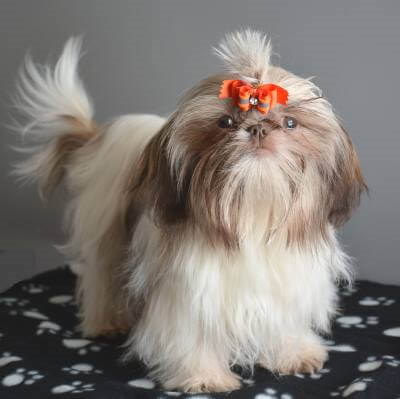- Home
- About the Shih Tzu
- Owning a Shih Tzu
7 Common Misconceptions About Owning a Shih Tzu
Owning a Shih Tzu by Nicole McCray |Published 03-04-2021
When you're in the market to buy or adopt a Shih Tzu, these types of specialized dog breeds can be somewhat confusing to navigate in terms of behaviors and expectations. While these "little lions," which have long been regarded as "show dogs" due to the famous, two-layered fur, are somewhat smaller in size and known for less shedding, they do have some specialized requirements of their behavior and personality.
Shih Tzu dogs are a breed that typically requires more attention from their owners. They tend to be friendly and happy in any environment, so smaller apartment living or spaces can suit them. However, there are many things that people think they know about owning these dogs, but as it turns out, a lot of it is misinformation.
So let's set the record straight when it comes to being a Shih Tzu owner.
Here are some common misconceptions and myths about owning a Shih Tzu that some people believe. You will also find some essential truths you should be aware of when owning one.

7 Common Misconceptions About Owning a Shih Tzu
1. SHIH TZU DOGS WANT TO BE THE ALPHA (THE "BOSS)
Many people believe that Shih Tzu dogs are derived from wolves, in which case they want to rule the roost and don't train well. This is a misconception because Shih Tzu don't even want to be the boss at home and is happy to follow the set rules.
Even though the outdated notion that dogs want to be the alpha has been dispelled, many owners still think their stubborn Shih Tzu wants to be in charge. Still, it's more of a response or reaction to what is happening rather than a genuine desire.
For example, if you let your Shih Tzu tear apart a shoe and don't respond with reinforcement, they may continue to do so with your lack of discipline. Dogs do need to learn manners and what is and is not acceptable. In this regard, every home is different. Some will allow their Shih Tzu on the furniture, and others won't. Shih Tzu dogs respond very quickly to positive reinforcement. Owners can take advantage of their Shih Tzu's desire to please the person they love.
Many dogs will push boundaries, and Shih Tzu are no exception. Testing boundaries can happen early on, particularly during the puppy stages, becoming more of a problem in adolescence. They are much like children in this regard as they want to see where their limits are. As an owner, you must show your dog the expectations you have and set those lines to know their place, and when doing so, they are happy to please you. If you let your Shih Tzu get away with certain behaviors, then there should be no surprise when they attempt to do it over and over again.
2. SHIH TZU DOGS DON'T REQUIRE MOTIVATION TO WORK OR BEHAVE NICELY
Shih Tzu are not known to be 'working dogs,' so they don't tend to have any innate motivation for activities or exercise. They need encouragement, which, if you've ever been a dog owner before, you know that treats are one of the best rewards for good behavior. Even if your Shih Tzu is not food-motivated, they crave attention and praise. Sometimes a simple scratch behind the ears is a reward itself for this breed.
They are an intelligent breed and will train well with patience and repetition. You can start with simple commands like "sit," "shake," and "stay," but feel free to expand upon your training to include more complex commands like "rollover" and "play dead."
Encouraging friendly acts and behaviors with reward is a great way to show your dog the differences between right and wrong so that they learn to be respectful. Many people believe that Shih Tzu will behave accordingly to those that feed them, which is a widespread misconception people apply to many dogs. They don't learn how to act without being taught how to do so.
3. SHIH TZUS CAME DIRECTLY FROM CHINA
Many people believe that the Shih Tzu hailed straight from China. However, they stemmed from west of China, in Tibet. They are always companioned with China because the Tibetans used to send these dogs over to Chinese royalty as gifts, so there tended to be more of them throughout the land. The Chinese also bred these dogs with Pugs or Pekingese breeds, which has created what we know as the Shih Tzu today.
The breed's history dates back about a thousand years, with the first dogs existing as early as 1000 B.C., known as "under the table" dogs kept in Tibet's monasteries. They describe them as the smaller, shaggy dogs used as watchdogs to alert the larger dogs.
4. SHIH TZUS DON'T MIND BEING LEFT ALONE
Suppose you are a traveler and like to go on vacations throughout the year. In that case, this is something you would want to think about carefully if owning a Shih Tzu. Contrary to what some people believe, these particular dogs do not like being left alone. They may even suffer from separation anxiety. They also don't enjoy strange kennels or being left with a stranger. Shih Tzu are friendly with people and will trust them, but they have to know them well enough, so if you do decide to leave your Shih Tzu in another's care, this is something you should know.
You might also want to be sure that the person watching your dog comes over often to keep your Shih Tzu company. You might even suggest having the person stay in the house instead of just stopping in to let the dog out or take it for a walk once or twice a day. Separation anxiety can cause these dogs to become very stressed. It can cause many problems such as ruined furniture or clothing, or even accidents in the house, even if potty trained.
You can always opt to take your dog with you on vacation if possible. Most locations have animal-friendly hotels or choose to make it a camping trip. Just be sure that you have the necessary paperwork and that they are up-to-date with their vaccines. Veterinary experts at Bond Vet, who operate a local animal hospital in NYC, recommend that you identify the nearest pet urgent care facility where you will be staying. This gives you some peace of mind if something should happen while visiting in a new area.
5. SHIH TZU ARE FINE WITH COLLARS ON
Some people are confused about dog collars. Collars are fine for hold identification and rabies tags. They should not, however, be attached to the end of a leash for walking purposes. Collars can put pressure on these dogs' windpipes since they are made out of cartilage. Your Shih Tzu will end up with various breathing problems.
It is best to use a harness with the Shih Tzu and any other brachycephalic breed.
6. SHIH TZUS ARE HYPOALLERGENIC
Two often misconstrued notions about the Shih Tzu are that they are hypoallergenic and don't shed. Just because these dogs don't tend to shed as much, they still shed between their two layers of hair. They are not hypoallergenic dogs, as no breed is completely hypoallergenic. Ultimately, even the Shih Tzu breed may not be ideal if you are more prone to allergies.
That said, if you have a Shih Tzu groomed regularly, you won't see much shedding, as it's most noticeable when brushing. The typical recommendation for grooming this breed is about every six weeks or so. This keeps the dog's hair from being matted and keeps your Shih Tzu nice and cool since they are more susceptible dogs to heatstroke in the hot sun.
7. SHIH TZUS SHOULD EAT SCRAPS FROM YOUR PLATE
Honestly, this is a misconception that spans across many owners with dogs. Shih Tzu, like most dogs, need to have a healthy, nutritious diet should not go overboard with treats. In particular, though, you should never feed a Shih Tzu any sweets you may have since multiple fats and sugars.
Being such a small dog breed can cause many problems in small amounts when you feed them off your plate. Buy specific dog treats, make some homemade ones, or even scope out some pet-safe fruits and veggies that you can share with your dog at home without having to wonder if it is okay.
Obesity in these small dogs can contribute to multiple health problems like liver and kidney disease, heart issues, or joint pain. Keep your Shih Tzu happy and healthy, and educate yourself not to overfeed them and contribute to any of those potential problems.
Owning a Shih Tzu Last Words
The best thing you can do for yourself when wanting to bring a Shih Tzu into your home is to do your research ahead of time to know what to expect. Make sure you're aware of what is a myth and what is not. If you have questions, you can consult your local animal shelter or a veterinarian.
Shih Tzus are sweet and friendly companions for many people. Effective training techniques along with a predictable routine will create an environment that both of you will enjoy.
Author Bio
Nicole is a die-hard animal lover who has worked in pet care for years. She is a former vet technician, a dog mom to her two rescue pups, and she grew up living and working at her family's pet boarding facility. She loves using her writing talents to share the insight she's learned throughout her career in the hopes that her knowledge can help other pet parents out there!
"Hi, I'm Janice Jones, a former veterinary technician and Shih Tzu expert with over 40 years of experience with the breed. Through Miracle Shih Tzu, I combine my medical background and extensive breed knowledge to provide reliable, practical advice for Shih Tzu owners. My mission is to help you give your Shih Tzu the happiest, healthiest life possible through evidence-based information and real-world solutions. Whether you're new to the breed or a seasoned owner, you'll find trusted guidance here for all aspects of Shih Tzu care.
I hold an undergraduate degree in Psychology with a minor in biology, Early Childhood Education, and Nursing, and a Master's in Mental Health Counseling.









